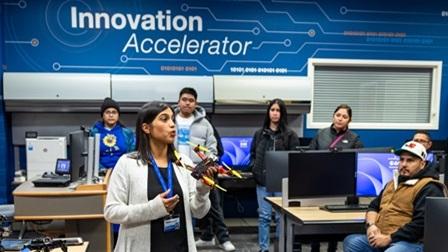Harper College launches new cybersecurity certificates and degree program

The innovative program was developed with input from regional business leaders to meet the needs of an industry forecasted to grow 242% in the next decade....


The Innovation Accelerator at Harper College is a collaborative initiative created to promote the development of cutting-edge education programs aligned with current employer demands. We work closely with community business leaders to design career-focused learning opportunities that prepare Harper graduates to enter the workforce as highly skilled employees. Our goal is to establish effective partnerships with regional employers to address industry needs and ensure that students acquire relevant, real-world skills for the career fields positioned for future growth.
The Innovation Accelerator is dedicated to fostering partnerships with business leaders and promoting emerging technologies to the benefit of education and student success. Visit our BILT and AI Consortium pages to learn more about these initiatives.
To learn more about our other initiatives and history, visit About Innovation Accelerator.
We are seeking business leaders across various industries to collaborate in designing career-focused programs that guarantee students will have the skills you're looking for in future employees. Our BILT is a unique opportunity to use your expertise to make a profound impact on the future of education and employment in the community.

Planned for Spring 2026, the consortium aims to foster collaboration among educators, school administrators, and higher education institutions to explore effective AI strategies. The goal is to enhance teaching practices utilizing artificial intelligence and improve student learning outcomes.


The innovative program was developed with input from regional business leaders to meet the needs of an industry forecasted to grow 242% in the next decade....

There are three key issues where we can have major community impact for our students and their families: workforce Pell, community college baccalaureate degrees and emerging technologies....

In recognition of Community College Month, Dr. Avis Proctor discusses how Harper is helping prepare the future workforce to meet "a modern-day Sputnik moment" in global competitiveness, innovation and national security....

Collaborative of faculty, administrators and business leaders helps develop new Harper College degree programs in artificial intelligence, cybersecurity and more....
Innovation Accelerator
Phone: 847.925.6700
Email: innovation@harpercollege.edu